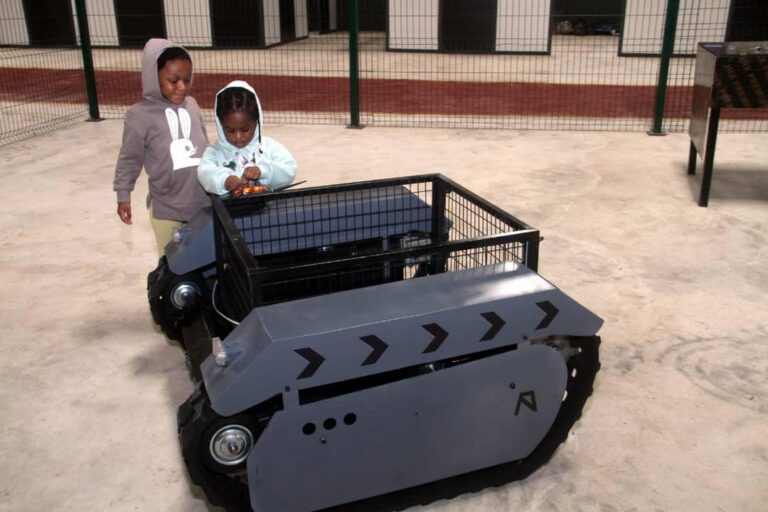For years, Nigeria’s hardware startup scene has been riddled with challenges — from skyrocketing component costs and inadequate infrastructure to a severe lack of specialized talent. Many promising ideas have withered at the ideation stage, never making it past a pitch deck or a press release. A perfect example is the University of Ibadan’s Humane team, whose innovative assistive tech for the visually impaired won Microsoft’s Imagine Cup in 2017 — yet never saw the light of day due to zero funding and nonexistent prototyping support.
But in recent years, two companies have emerged to challenge the status quo: NEV Electric and Terrahaptix.
The New Wave: Hardware is Making a Comeback
NEV Electric has pulled in an impressive $14 million in revenue in just 14 months, with projections to hit $50 million within the next 15. Meanwhile, Terrahaptix has secured $2 million in drone orders in 2024 alone — mostly from Nigeria’s oil and mining industries — and has now begun exporting to South Africa.
In a country obsessed with fintech, these two companies are proving there’s room — and serious money — in hardware.
Outliers or Indicators of a Trend?
While some still see them as outliers in a sector that’s barely populated with 20 active players, a closer look reveals they’re not lucky exceptions — they’re strategic pioneers.
Both companies broke the mold by refusing to treat hardware as a standalone product. Instead, they built hybrid business models, fused global strategy with local execution, and embraced lean, cost-effective technologies.
The NEV Electric Playbook: Riding the EV Surge
With over 5,000 electric vehicles now on Nigerian roads, NEV Electric is carving out its space as Africa’s largest electric bus manufacturer, with over 100 buses already deployed. CEO Mosope Olaosebikan credits their momentum to a forward-thinking bet placed by Boly Media, NEV’s international parent company, which saw the potential in Africa’s clean energy transition before many others did.
NEV Electric didn’t wait for the market — it built it.
Terrahaptix: More Than Just Drones
Terrahaptix’s strength lies in its software-powered backend. Their surveillance drones are just the surface layer — what really makes the business scalable and appealing to investors is ArtemisOS, the company’s proprietary system that coordinates drone activities and generates recurring revenue via SaaS models.
This has already found application in critical infrastructure like the Aba Independent Power Plant, with CEO Nathan Nwanchukwu emphasizing that it’s the software’s monetization potential that draws investor interest.
What Nigerian Startups Can Learn
Here’s why NEV Electric and Terrahaptix are winning — and what other startups should take note of:
1. Global Perspective, Local Execution
NEV’s international backing combined with deep local knowledge allowed it to move faster and smarter. Terrahaptix did the same by aligning with global automation trends while operating lean in Nigeria.
2. Combine Hardware with Software
Hardware alone doesn’t scale. But with intelligent software, you create a system — not just a product. That’s what attracts VC interest and ensures sustainability.
3. Open-Source Tools & Lean Manufacturing
Both startups used tools like Arduino, Raspberry Pi, and just-in-time manufacturing to build prototypes without burning capital. This approach minimized warehousing costs and kept operations flexible — crucial in Nigeria’s volatile market.
The Challenges Ahead
Despite these breakthroughs, Nigeria’s hardware ecosystem is still fragile:
- Production costs remain high
- Technical talent is limited
- Manufacturing infrastructure is inadequate
And then there’s the software bias — most Nigerian engineers are pulled toward app development or fintech, leaving hardware with a shallow talent pool.
To move forward, stakeholders — from government to academia to private investors — must work together to:
- Establish manufacturing hubs
- Provide hardware-specific funding
- Create technical training programs in universities and polytechnics
A Moment of Opportunity?
According to Nwanchukwu, global geopolitical shifts could make Africa — and Nigeria in particular — an attractive alternative to Chinese manufacturing. As Western economies look to diversify their supply chains, there’s a real chance for Nigeria to rise — if it can act fast.
Signs of political awareness are already emerging, like Nigeria’s solar panel import ban, aimed at encouraging local production. But policy alone isn’t enough — mindset, capital, and infrastructure must follow.
Final Thoughts: From Rare Wins to National Strategy
The failure of Nigeria’s Humane and the $230 million flop of Silicon Valley’s Humane AI Pin have one thing in common: they remind us that hardware is hard — everywhere. But NEV Electric and Terrahaptix prove it’s not impossible, especially when done smartly.
Their paths offer more than success stories — they provide blueprints. If Nigeria can scale what they’ve started, hardware innovation could evolve from a once-in-a-blue-moon success to a sustainable, scalable movement.

